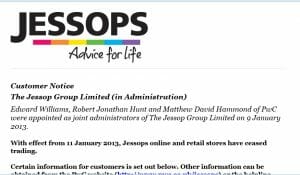The terribly sad news that another well-known high street retailer was to close its doors was announced last week. Jessops a regular on UK high streets for several decades has gone to the wall and its 187 stores finally closed their doors last night. 
- 80% of UK shoppers have reserved products online for collection in stores in the past year (up from 74% in 2011).
- 44% of UK shoppers always research purchases on the internet before buying offline.
- Just 4% never use the internet for product research.
- 43% of UK shoppers now use smartphones while on the move to compare prices and read product reviews (up from 19% last year).
Our high streets are suffering with one in nine retail outlets now officially standing empty but ecommerce is experiencing record growth as more and more people buy their products online. Working in online PR means we regularly have to help businesses look for strategies that are going to deliver both online media exposure and more increasingly direct online sales. This is something the communications sector is having to address day by day. Times have changed and public relations is no longer just about media coverage in the national newspapers. It is now more about securing back links, increasing targeted followers, creating conversations about products and finding ways to increase conversion levels on our client’s websites. If the communications industry can adapt and evolve why can’t the high street retail sector? I don’t want to see any more of our great brands dying on the high street and I think it’s high time that the boards of these businesses came together and sat down and made the tough decisions now before it really is too late. Personally, I am amazed that businesses like HMV are still trading at all. The music retailer announced losses again in December and it has been doing that for several years. Surely, it’s time for that business to close some of its high street stores and look to move the majority of its business online. People simply don’t buy as many CDs or DVDs as they used too – the market has changed so the strategy must change too. The same can be said for digital cameras and this is why Jessops has suffered this week. If you just back one horse in business you are vulnerable to the horse leaving the stable and you will have no business left. Digital media can still save the high street, location based marketing is the future for retail operations sites such as Foursquare and Google Places and vouchers related to a customer’s location could really help high street retailers claw back some of the revenues they have lost. Bricks and mortar alone is now officially a failed strategy – it’s time to evolve.



